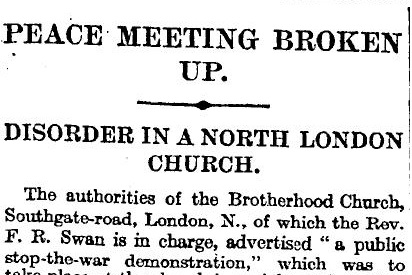We are developing the social individualist meta-context for the future. From the very serious to the extremely frivolous... lets see what is on the mind of the Samizdata people.
Samizdata, derived from Samizdat /n. - a system of clandestine publication of banned literature in the USSR [Russ.,= self-publishing house]
|
I did not know this:
Dawkins began writing the book in 1973, and resumed it in 1975 while on sabbatical. At the suggestion of Desmond Morris, the zoologist and author of The Naked Ape (Jonathan Cape, 1967), Dawkins showed some draft chapters to Tom Maschler of Jonathan Cape, who strongly urged that the title be changed to ‘The Immortal Gene’. Today, Dawkins regrets not taking the advice. It might have short-circuited the endless arguments, so beloved of his critics and so redolent of the intentional stance (in which we tend to impute mental abilities to unconscious things, from thunderstorms to plants), about whether selfishness need be conscious. …
That is Matt Ridley writing In retrospect about Dawkins and The Selfish Gene.
“Immortal” would certainly have been accurate in a way that “selfish” was not. But perhaps having what was arguably a mistake in the title caused heat as well as light in the responses to The Selfish Gene, and thereby enabled this great book, in the end, to spread more light than it might have done if more precisely titled.
Ridley continues:
… It might even have avoided the common misconception that Dawkins was advocating individual selfishness.
Indeed. Actually, Dawkins has rather orthodox leftist views about such things as individual selfishness (unlike Matt Ridley). But by incurring the ignorant wrath of PC-ers, Dawkins has, I think, been driven away from unthinking leftism, towards more thinking non-leftism, of the sort that Matt Ridley espouses. He is certainly not a member of the PC tribe.
This is a common story. Oafish PC virtue signalling has caused many a good leftist to find himself on the wrong end of his own opinions, and thus to learn at least some of the errors of his ways.
Had he called The Selfish Gene instead The Immortal Gene, might Dawkins have remained, or been allowed to remain, a more orthodox leftist? And if he had, would he, for instance, have been so ready to denounce Islam as strongly as he has, alongside his denunciations of Christianity? Would he now be so ready to mock feminism, and thereby incur yet more PC wrath? (“We believe strongly in freedom of speech … However …”) Dawkins probably would have got involved in such scraps anyway, but he might have had more to lose.
Matt Ridley’s central point is that, whether correctly titled or not, The Selfish Gene combined being original science with successful scientific popularisation in a way that is very rare.
I have been reading Charles Murray’s book, Coming Apart.
I recommend this book, but I doubt that I myself will be reading every word of it, and certainly not every number. This is because I am already convinced by Murray’s basic thesis, which is that that America is becoming increasing divided along class lines. The temptations of government welfare, just as you would expect, have enticed the poor into self-destructive habits far more than the rich, because the rich, being rich, are insulated by their riches from these temptations. The rich have also resisted the temptation to smash up their families and raise their children out of wedlock, even as they mock those who still proclaim such notions in public. When it comes to family values, says Murray, the rich ought to be more ready to preach what they practice. All this strikes me as very true.
I was particularly struck by this, which is how Part III (“Why It Matters”) begins (p. 238 of my Penguin paperback edition):
The economist Maynard Keynes, accused of changing his mind about monetary policy, famously replied, “When the facts change, I change my mind. What do you do, sir?” The honest answer to Keynes’s question is “Often, nothing.” Data can bear on policy issues, but many of our opinions about policy are grounded in premises about the nature of human life and human society that are beyond the reach of data. Try to think of any new data that would change your position on abortion, the death penalty, legalization of marijuana, same-sex marriage, or the inheritance tax. If you cannot, you are not necessarily being unreasonable.
So it has been with the evidence I have presented. A social democrat may see in parts 1 and 2 a compelling case for the redistribution of wealth. A social conservative may see a compelling case for government polices that support marriage, religion, and traditional values. I am a libertarian, and I see a compelling case for returning to the founders’ conception of limited government.
In other words, as Perry de Havilland never tires of saying: metacontext, metacontext, metacontext.
Keynes himself changed his mind a lot less than he said he did, I think.
Like Charles Murray, I am a libertarian. But like Murray, and unlike many libertarians, I also believe that old school married parenthood is the best setting in which to raise children, even if, like all other libertarians, I absolutely do not believe that old school married parenthood should be legally compulsory or that any alternatives to it should be legally forbidden. I am not myself married, but a lot of my best friends are libertarians who are married and who are now raising children. They are my friends not just because I like them, but because I admire what they are doing. I love to attend weddings, and have become good at photographing them. Partly this is because I just have, and because I especially like to photograph the many other amateur photographers also present. But I also love weddings because I strongly believe in what is promised at and accomplished by such ceremonies. So, I like Charles Murray’s general ideological attitude to life.
But, I also strongly agree with Murray about how hard it can be to change such ideological attitudes. In particular, merely spraying facts around the political landscape does not necessarily change it very much. Rather does it merely, as Murray says, confirm in the minds of all who hear these facts that they have been right all along about what needs to be done about them.
But this does not mean that minds cannot be changed. Facts, if they are overwhelming enough, can make a difference, especially to people who are young enough still to be making up their minds. But when communicating with such people it is essential not to confine yourself only to facts, however overwhelming they may seem to you. You should also engage at the ideological level. You should state the metacontextual conclusions that you want people to arrive at.
If this does nothing else, it at least enables people to realise that they are in this or that metacontextual team, and to help to make that team a little bit stronger.
It is one thing merely to be a libertarian. You will make a lot more difference to the world if you also realise that a libertarian is what you are. Being a libertarian means have a much more restricted idea of what governments should compel and forbid than tends to prevail nowadays. But it does not mean refraining from having and expressing opinions about how to live wisely.
…for goodness sake do NOT then go to the police and tell them how you did it!
So the only reason you did not get raped was that you used pepper spray on this violent thug? Don’t you know pepper spray is illegal?
It is far better in the eyes of the state for you to be raped than have effective means to defend yourself. Seriously, do you think the Boys-in-Blue are there to protect you? If you do think that, then let me disabuse you of that notion: they are there to maintain the power and privileges of the state and any time their actions coincide with your interests (such as catching a violent criminal), that is serendipity rather than design.
With EU political leaders nakedly threatening the UK with political and economic punishment if it leaves the EU, they are pretty much making the case for Farage et al.
If ever there was group of politicians just begging for a two finger Agincourt salute, it is the people mentioned in this article.
The bit I find particularly amusing is the notion the great and good in the EU think they can decide post-Brexit if London will remain a financial centre. Actually all it will take is more deregulation to make the UK even more attractive than it is now, and would that be easier in or out of the EU? Well out, obviously.

Charles à Court Repington was a former army officer who became The Times’s military correspondent. I have mentioned him before and so far I have been pretty impressed with his analyses. But in this article (here and here), in which he considers strategy and high-level tactics, he outdoes himself.
Here are his main points:
1. The Western Front is the key theatre. It’s also the nearest. Britain’s main effort must be concentrated here.
2. The allies must co-ordinate their efforts. Going on the offensive at the same time stretches the enemy’s resources.
3. The search for a breakthrough is futile. The allies need to wear out the enemy through bite-and-hold techniques – in other words, take a chunk out of the enemy’s line and hold it.
4. Cavalry is useless.
5. There are too many cavalry generals in senior positions.
6. Artillery is the dominant arm in this war, or as the French were later to put it: “artillery conquers, infantry occupies.”
7. The artillery needs more shells.
So, what happened?
After the catastrophe at Gallipoli, the “Easterners”, as they were known – or “cranks” as I tend to think of them – were largely ignored. The main effort was indeed put on the Western Front and that is where the war was eventually won.
Co-ordination. As it happens, at Chantilly in December 1915, the Allies had already agreed to co-ordinate their efforts. Unfortunately, the Germans took the initiative at Verdun, more or less completely taking the French out of the picture. Still, the Somme, the Brusilov offensive and an Italian offensive did take place at more or less the same time.
Haig continued to look for breakthroughs until about August 1917. He did so despite just about everyone around him – including Robertson, his nominal superior – thinking he was wrong. He did so in the belief – partly fed by an intelligence chief who told him what he wanted to hear – that the German army was about to crack.
Cavalry. Some claim that cavalry was useful in the Hundred Days Offensive of 1918. Personally, I am doubtful. It certainly wasn’t any use beforehand with the exception of 1914.
Cavalry generals. If we look at the really useless Western-Front commanders (army commanders and above) we find Allenby, Gough and French – all cavalry. The successful ones were Plumer, Horne, Byng and (belatedly) Rawlinson, of whom only Byng had any background in cavalry.
That artillery was the dominant arm is beyond question. In battle after battle, if the artillery was right, victory followed. If it wasn’t, it didn’t. That’s not to say there weren’t great changes in infantry tactics and equipment, just that these were a lot less important. It took until 1917 for the artillery to acquire the shells it needed.
About the only thing he gets wrong is his 150,000 figure for German casualties at Loos. The real figure was about a fifth of that. Otherwise he is bang on the money.

In 1916, the Reverend Swan of the Brotherhood Church in Hackney held (I kid you not) a “Stop the War” meeting. It did not go well.
Trouble was forseen by the police
Now, why would that be?
…the first hymn was sung. Then the trouble began.
…soldiers and civilians rose in a body and denounced the cha’rman [sic] and his companions as traitors.
[The vicar’s supporters] tried to drown the opposition by singing “The Red Flag”…
Oh yeah?
…but the public voice was stronger and carried the day with “Keep the home fires burning.”
Those were the days.
…some one began throwing down Chinese crackers. Hand-to-hand struggles became common all over the floor of the church. A man, who said he was wounded at Neuve Chapelle and had been invalided out of the Service, stood up on a seat in the centre of the building and pointing at the little crowd of young men, asked why they were not in khaki.
The vicar abandoned the proceedings but the crowd did not.
…a resolution demanding that the war should be carried on with all vigour until Germany had been beaten was carried with cheers.
When I first read this article, I assumed this meeting was the doing of some wooly-headed cleric. Not so. The Brotherhood Church’s other great claim to fame was that in 1907 it hosted the 5th Congress of the Russian Social Democratic Labour Party (General Secretary, one V. I. Lenin). And, in case you were wondering, no, they were not duped.
You’d need a heart of stone not to laugh.
 The Times 17 January 1916 p5
Having here, as we do, lots of American commenters who are knowledgeable about the details of American politics means that it makes little sense for us Samizdatan Brits to be telling Americans about American politics. But it makes perfect sense for the likes of me to ask questions about American politics. And my question to all American readers who choose to care about it is: Is this true?
This being a Breitbart piece by John Nolte in which he claims that Donald Trump has, pretty much instantaneously and single-handedly, destroyed Hillary Clinton, by flinging at her the accusation that she is an enabler and political ally of a serial woman-destroyer. This mud has been floating around for decades. Everyone has known it. But thanks to Trump and his mastery of the social media, this mud has now, finally, been made to stick. For a quarter of a century the corrupt American mass media have been protecting the Clintons from all this. Now, that protection has been obliterated, by Donald Trump.
If that’s true, then good – very good – for Donald Trump. I have all the obvious doubts about this bizarre man that others have expressed, here and elsewhere. But, one of the basic rules of civilisation is that the rules made by big people, and indeed the basic rules of behaving decently, should apply to big people as well as to little people. The idea that the king is above the law is the very essence of lawlessness. And in the person of “The Donald”, says Nolte, this idea – that the rules apply to the big person that is Hillary Clinton – has finally being applied to and is having serious consequences for this appalling woman, if not in an actual court of law, then at least in the court of public opinion.
Nolte further argues – his piece is entitled “Bernie Sanders Rising Because Trump Annihilating Hillary Clinton” – that the rise of Bernie Sanders is not really a rise; it is merely the collapse of Sanders’s rival for the Democrat nomination, Hillary Clinton.
But: Is all or any of this true? I really look forward to hearing what our commentariat has to say.
I have always thought that we libertarians have a lot to learn from socialists. Not about what are true ideas. They can tell us very little about that, although the process of combating those ideas is very valuable. But about how to spread ideas – how to make ideas count for something – the socialists can tell us a great deal. Their success in spreading their own ideas is all the more impressive when you consider how very bad most of these ideas are.
We can learn, for instance, patience. This is from a piece in the Guardian a few days ago by Rafael Behr:
Whatever else Corbyn’s surprise ascent last year represents, it demonstrates the value of patience. It takes a particular temperament to plug away in apparently futile opposition, making pretty much the same speech to the same fringe meeting for 30 years, letting no belief be washed away by shifting political and economic tides, but instead sifting events for bits of evidence to support the unwavering faith. Not everyone who is cast on the wrong side of history sticks around, confident that history will swing by again in the opposite direction. Yes, Corbyn has been lucky, but fortune only furnished the battle. He gets the credit for winning.
And he is still winning. The tendency in Westminster is to measure success by the restless pulse of the news cycle and the temperature of public opinion. In those terms, Corbyn is not doing so well. It took the best part of a fortnight to conduct a shadow cabinet reshuffle from which the casual observer will have gleaned that Labour is in chaos, divided over nuclear defences with a new bias towards the view that Britain shouldn’t have any. By conventional measures this is bad, but the tradition from which Corbyn hails does not respect those conventions.
To sneer at 14 days of reshuffle-related mess is an error based on the Westminster canard that a week is a long time. Corbyn and friends come from a place where 14 years is a pause for breath; where 30 years of barren rhetoric can whizz by without frustration. Set that as the tempo of achievement and the appointment of an anti-Trident shadow defence secretary is a monumental triumph. Every day in the leader’s chair is more triumphant still if it stops the Labour party returning to what it was.
When libertarians have contrived serious victories, these are the sorts of ways we have done it. When we start winning bigger and more dramatic victories, these are the sorts of ways we will do it.
In a way, then, Palin’s speech was the perfect endorsement for Donald Trump’s campaign: an incoherent mess of angry, resentful sentiment, delivered in a way designed to provide the maximum in media spectacle. Palin effectively—and, okay, somewhat poetically—captured and amplified the identity-politics-driven nonsense that feeds both the candidate and his supporters.
– Peter Suderman
A man who has been acquitted of rape, after a retrial, (spot the insinuation) has made subject to an ‘interim sexual risk order’ by Magistrates in York.
It requires the man disclose any planned sexual activity to the police or face up to five years in prison.
The order – which was drawn up by magistrates in Northallerton, North Yorkshire, and extended in York – reads: “You must disclose the details of any female including her name, address and date of birth.
“You must do this at least 24 hours prior to any sexual activity taking place.”
A further court hearing in May will decide whether the interim order should be made into a full order, which has a minimum duration of two years and can last indefinitely. Sexual risk orders were introduced in England and Wales in March last year and can be applied to any individual who the police believe poses a risk of sexual harm, even if they have never been convicted of a crime. They are civil orders imposed by magistrates at the request of police.
This is an interim order, pending a full hearing, and the court’s power is wide:
(3)The court may, if it considers it just to do so, make an interim sexual risk order, prohibiting the defendant from doing anything described in the order.
The Full Monty, as it were, is below in section 122A of the Sexual Offences Act 2003, with a broad discretion for the order to be made. So now this chap must manage his affairs so that he pops down the police station, queues at the desk with the people reporting lost wallets etc. and then reports the details of his intended ‘conquest’ at least 24 hours before he gets frisky, sexual ‘activity’ not just intercourse, is covered. It is not clear what Plod will do in the meantime, but I expect that the lady concerned may face some questioning.
Well George Orwell’s Anti-Sex League appears to be taking shape here. Can anyone remember this being discussed by candidates at any General Election? Did the Stasi even dream of doing this sort of thing?
Sexual risk orders (England and Wales)
122A Sexual risk orders: applications, grounds and effect
(1) A chief officer of police or the Director General of the National Crime Agency (“the Director General”) may by complaint to a magistrates’ court apply for an order under this section (a “sexual risk order”) in respect of a person (“the defendant”) if it appears to the chief officer or the Director General that the following condition is met.
(2) The condition is that the defendant has, whether before or after the commencement of this Part, done an act of a sexual nature as a result of which there is reasonable cause to believe that it is necessary for a sexual risk order to be made.
(3)A chief officer of police may make an application under subsection (1) only in respect of a person—
(a)who resides in the chief officer’s police area, or
(b)who the chief officer believes is in that area or is intending to come to it.
(4)An application under subsection (1) may be made to any magistrates’ court acting for a local justice area that includes—
(a)any part of a relevant police area, or
(b)any place where it is alleged that the person acted in a way mentioned in subsection (2).
Update: The man in question is now facing a charge.
‘No prospect of relationship’
“I had more freedom in prison,” he said.
“I’m in a state of shock, I cannot believe this is how the justice system works.”
He said there was “no prospect” of a relationship at the moment.
He said: “Can you imagine, 24 hours before sex? Come on.
He gave the example of chatting to a woman and saying: “There’s a nice French restaurant I’d like to take you to, but first the police are just going to come around for a little chat.”
“Knock, knock, knock, this is the police, (Mr X) is subject to a sexual risk order and is considered to be potentially dangerous… then they leave.”
America is truly the land of opportunity, even multimillionaire actors can be victims deserving special treatment.
A commenter called Joshinca, commenting on this post about the Oscars, by Roger Simon.
I know this might seem a bit contrarian-for-the-hell-of-it, and I might miss out, but these days a good rule of thumb for me is that if a film has won an Oscar, then there is a more than trivial possibility that it sucks in some way. They resemble Nobel Peace prizes, almost.
|
Who Are We? The Samizdata people are a bunch of sinister and heavily armed globalist illuminati who seek to infect the entire world with the values of personal liberty and several property. Amongst our many crimes is a sense of humour and the intermittent use of British spelling.
We are also a varied group made up of social individualists, classical liberals, whigs, libertarians, extropians, futurists, ‘Porcupines’, Karl Popper fetishists, recovering neo-conservatives, crazed Ayn Rand worshipers, over-caffeinated Virginia Postrel devotees, witty Frédéric Bastiat wannabes, cypherpunks, minarchists, kritarchists and wild-eyed anarcho-capitalists from Britain, North America, Australia and Europe.
|







